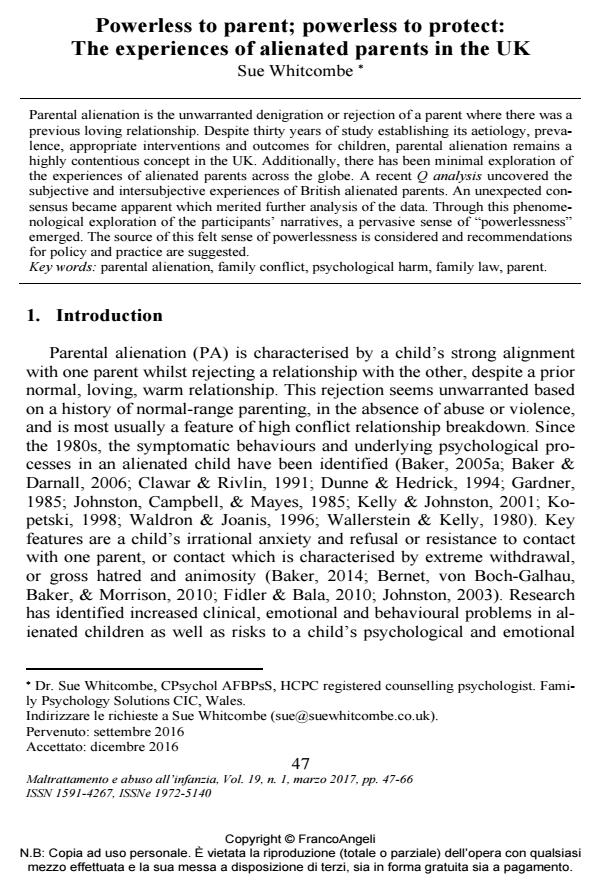Powerless to parent; powerless to protect: The experiences of alienated parents in the UK
Journal title MALTRATTAMENTO E ABUSO ALL’INFANZIA
Author/s Sue Whitcombe
Publishing Year 2017 Issue 2017/1
Language English Pages 20 P. 47-66 File size 244 KB
DOI 10.3280/MAL2017-001004
DOI is like a bar code for intellectual property: to have more infomation
click here
Below, you can see the article first page
If you want to buy this article in PDF format, you can do it, following the instructions to buy download credits

FrancoAngeli is member of Publishers International Linking Association, Inc (PILA), a not-for-profit association which run the CrossRef service enabling links to and from online scholarly content.
Parental alienation is the unwarranted denigration or rejection of a parent where there was a previous loving relationship. Despite thirty years of study establishing its aetiology, preva-lence, appropriate interventions and outcomes for children, parental alienation remains a highly contentious concept in the UK. Additionally, there has been minimal exploration of the experiences of alienated parents across the globe. A recent Q analysis uncovered the subjective and intersubjective experiences of British alienated parents. An unexpected con-sensus became apparent which merited further analysis of the data. Through this phenome-nological exploration of the participants’ narratives, a pervasive sense of "powerlessness" emerged. The source of this felt sense of powerlessness is considered and recommendations for policy and practice are suggested.
Keywords: Parental alienation, family conflict, psychological harm, family law, parent.
- Psychometric Properties of the Parental Alienation Scale - EAP Paula Inez da Cunha Gomide, Claudia Nascimento Paleari, Pedro Afonso Cortez, Fernanda Otoni, in Paidéia (Ribeirão Preto) e3430/2024
DOI: 10.1590/1982-4327e3430 - A Comparison of MMPI-2 Profiles Between Parental Alienation Cases and Custody Cases Paolo Roma, Daniela Marchetti, Cristina Mazza, Eleonora Ricci, Lilybeth Fontanesi, Maria Cristina Verrocchio, in Journal of Child and Family Studies /2022 pp.1196
DOI: 10.1007/s10826-021-02076-1 - Beyond survival: Strengthening community‐based support for parents receiving a family service intervention Rachel Goff, Christina Sadowski, Kerryn Bagley, in Child & Family Social Work /2023 pp.491
DOI: 10.1111/cfs.12979 - Understanding Targeted Parents’ Experience of Parental Alienation: A Qualitative Description from Their Own Perspective Saulyn Lee-Maturana, Mandy Matthewson, Corinna Dwan, in The American Journal of Family Therapy /2021 pp.499
DOI: 10.1080/01926187.2020.1837035 - Caratteristiche psicologiche e relazionali in coppie altamente conflittuali coinvolte nell'alienazione genitoriale Maria Cristina Verrocchio, Daniela Marchetti, Paolo Roma, Stefano Ferracuti, in RICERCHE DI PSICOLOGIA 4/2019 pp.679
DOI: 10.3280/RIP2018-004008 - Empirical research on parental alienation: A descriptive literature review T.M. Marques, I. Narciso, L.C. Ferreira, in Children and Youth Services Review 105572/2020 pp.105572
DOI: 10.1016/j.childyouth.2020.105572
Sue Whitcombe, Powerless to parent; powerless to protect: The experiences of alienated parents in the UK in "MALTRATTAMENTO E ABUSO ALL’INFANZIA" 1/2017, pp 47-66, DOI: 10.3280/MAL2017-001004